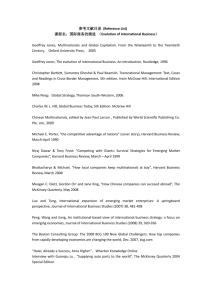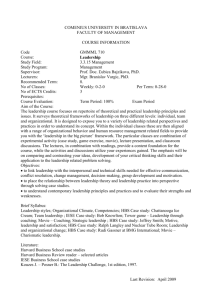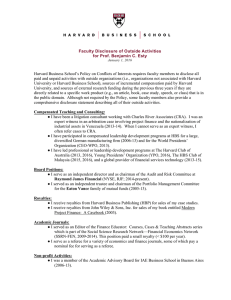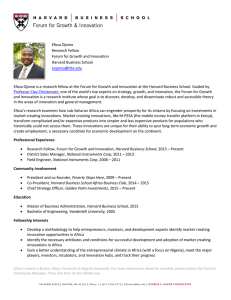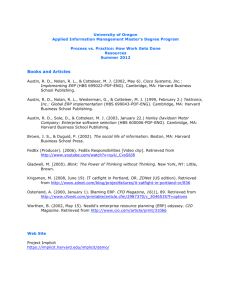Harvard Business School Faculty & Research
advertisement
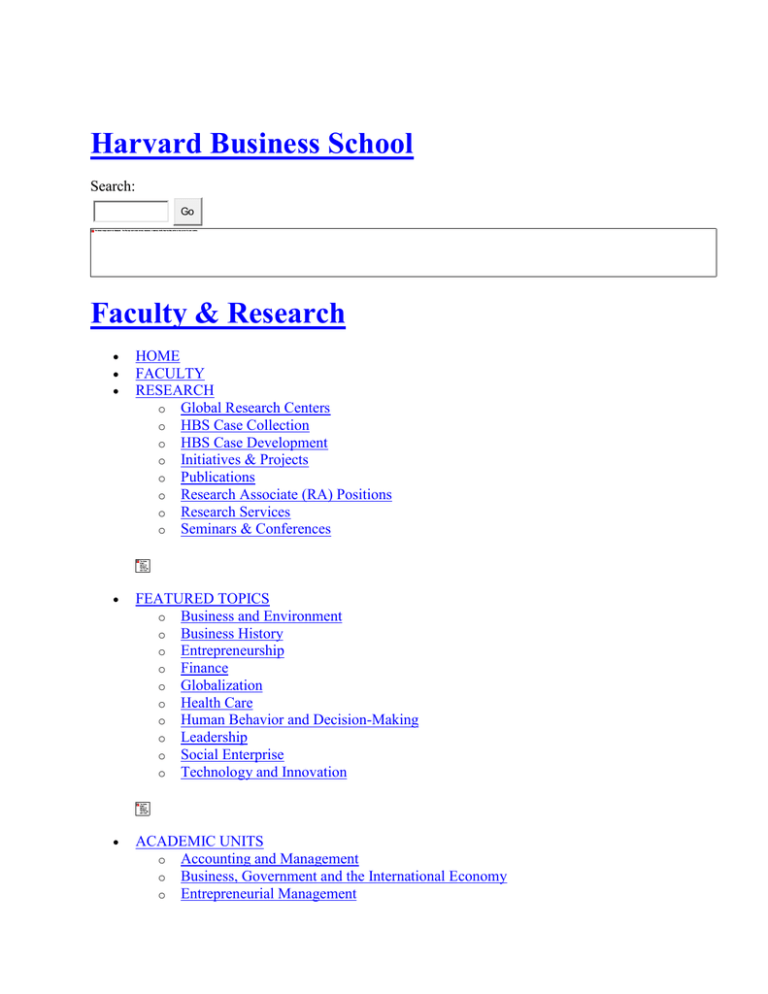
Harvard Business School Search: Go Faculty & Research HOME FACULTY RESEARCH o Global Research Centers o HBS Case Collection o HBS Case Development o Initiatives & Projects o Publications o Research Associate (RA) Positions o Research Services o Seminars & Conferences FEATURED TOPICS o Business and Environment o Business History o Entrepreneurship o Finance o Globalization o Health Care o Human Behavior and Decision-Making o Leadership o Social Enterprise o Technology and Innovation ACADEMIC UNITS o Accounting and Management o Business, Government and the International Economy o Entrepreneurial Management o o o o o o o Finance General Management Marketing Negotiation, Organizations & Markets Organizational Behavior Strategy Technology and Operations Management Faculty, public Go Unit: Strategy Contact: (617) 495-6038 Send Email Additional Information My Website CV Course Development VIDEOS Working Knowledge South Asia Institute Winning in Emerging Markets Press Doctoral Students Areas of Interest diasporas economic development emerging markets globalization strategy MORE Tarun Khanna Jorge Paulo Lemann Professor Print Entire ProfileMore Tarun Khanna is the Jorge Paulo Lemann Professor at the Harvard Business School, where he has sought for two decades to study the drivers of entrepreneurship in emerging markets as a means of economic and social development. At HBS since 1993, after obtaining degrees from Princeton and Harvard, he has taught courses on strategy, corporate governance and international business to MBA and Ph.D. students and senior executives. For many years, he has served as the Faculty Chair for HBS activities in India and South Asia. A summary of his work on emerging markets appeared in his 2010 co-authored book, Winning in Emerging Markets, and an example of his comparative work on entrepreneurship appears in his 2008 first-person analysis of China and India, Billions of Entrepreneurs, both published by Harvard Business Press and translated into many languages. In 2014, his piece, Contextual Intelligence, was a runner-up for the McKinsey Prize for the year’s best article in the Harvard Business Review. He was named the first director of the university-wide Harvard South Asia Institute in the fall of 2010. The institute rapidly grew to engage over 150 faculty from across Harvard in projects embracing the pure sciences, social sciences and the humanities, and spanning the region from Afghanistan to Myanmar. In this role, he currently teaches a popular university-wide elective course, Contemporary Developing Countries, where students work in multi-disciplinary teams to devise practical solutions to complex social problems. The course is part of Harvard’s undergraduate general education core curriculum, and is rare in that it also attracts graduate students from across the university, engaging everyone from sophomores to surgeons. In 2007, he was nominated Young Global Leader (under 40) by the World Economic Forum; and in 2009, elected as a Fellow of the Academy of International Business. In 2015, he was named by the Government of India to chair the national commission to help shape the fabric of India’s entrepreneurial ecosystem. Outside HBS, he serves on numerous for-profit and not-for-profit boards in the US and India, including AES, a Washington DC headquartered global power company, and India-based SKS Microfinance, one of the world’s largest firms dedicated to financial inclusion for the poor. He is a co-founder of several entrepreneurial ventures in the developing world, spanning India, China, Southeast Asia and the Middle East. Recently, he co- founded Axilor, a vibrant incubator in Bangalore. In 2015, he was appointed a Trustee of Boston’s Museum of Fine Arts. He lives in Newton, MA, with his wife, daughter and son. Print Entire ProfileLess Featured Work Publications Research Summary Teaching Awards & Honors 1. Contextual Intelligence I have come to a conclusion that may surprise you: trying to apply management practices uniformly across geographies is a fool's errand. Best practices simply don't travel well across borders. That's because conditions not just of economic development but of institutional maturity, educational norms, language, and culture vary enormously from place to place. Students of managerial practice once thought that their technical knowledge of best manufacturing practices (to take one example) was sufficiently developed that processes simply needed to be tweaked to fit local conditions. More often, it turns out, they have to be reworked quite radically—not because the technology is wrong but because everything around it changes how it will work. There's nothing wrong with the tools we have at our disposal, but their application requires contextual intelligence: the ability to understand the limits of our knowledge and to adapt that knowledge to a context different from the one in which it was acquired. Until we can better develop and apply contextual intelligence, failure rates for cross-border businesses will remain high, what we learn from experiments unfolding around the world will remain limited, and the promise of healthy growth in all parts of the world will remain unfulfilled. 2. Winning in Emerging Markets: A Roadmap for Strategy and Execution by Tarun Khanna and Krishna G. Palepu, with Richard Bullock, published by Harvard Business Press in April 2010 Most books thus far on emerging markets are either investing-oriented, or country - or market-specific, or descriptive. No book has definitively targeted the corporate strategists who need a practical framework and assessment tools for analyzing emerging markets, identifying new business opportunities, and planning strategy and execution. This book does just that. Rather than defining emerging markets by particular size or growth qualifications, Palepu and Khanna argue that the primary exploitable characteristic of these markets is their lack of developed infrastructures and institutions that might enable efficient business operations. Credit card systems, intellectual property adjudication, and data research firms are all market intermediaries taken for granted in advanced economies, for example, and operating without them poses specific challenges - as well as major opportunities. Building upon of the authors' series of popular HBR articles on the topic, the book gives managers a systematic framework for assessing the institutional context of any emerging market so that they can spot institutional voids, position themselves in the market, and finally build execution strategies that factor in an informed prognosis of that market's future. Translation available in Chinese. AbstractReview 3. Billions of Entrepreneurs: How China and India Are Reshaping Their Futures and Yours By Tarun Khanna, published by HBS Press in January 2008, (Penguin Books in India and South Asia) Translations available in Arabic, Brazilian Portuguese, Indonesian, Korean, Portuguese, Turkish, Vietnamese. Western concerns about the rise of China and India are raising alarms today, much as they were fifty years ago. China and India currently operate in the global economy as mirror images of each other—one favors multinationals over indigenous private companies, the other advantages its locals and shuns foreigners. In a book published by Harvard Business School Publishing, HBS Professor Tarun Khanna explores the likely evolution of the Chinese and Indian models and the implications for the world in four settings—China and the world, India and the world, Chinese and Indian mutual relations, and the view from the developed world. And just as hysteria and protectionism proved unwarranted half a century ago, Khanna argues that the rise of China and India is again an opportunity for profit and hope. Excerpt 4. Business Groups in Emerging Markets: Paragons or Parasites? by Tarun Khanna and Yishay Yafeh, Journal of Economic Literature, June 2007 Diversified business groups, consisting of legally independent firms operating across diverse industries, are ubiquitous in emerging markets. Groups around the world share certain attributes but also vary substantially in structure, ownership, and other dimensions. This paper proposes a business group taxonomy, which is used to formulate hypotheses and present evidence about the reasons for the formation, prevalence, and evolution of groups in different environments. In interpreting the evidence, the authors pay particular attention to two aspects neglected in much of the literature: the circumstances under which groups emerge and the historical evidence on some of the questions addressed by recent studies. They argue that business groups are responses to different economic conditions and that, from a welfare standpoint, they can sometimes be "paragons" and, at other times, "parasites." The authors conclude with an agenda for future research. Read article (requires registration). 5. Can India Overtake China? By Tarun Khanna and Yasheng Huang, Foreign Policy, July - August 2003 What’s the fastest route to economic development? Welcome foreign direct investment (FDI), says China, and most policy experts agree. But a comparison with long-time laggard India suggests that FDI is not the only path to prosperity. Indeed, India’s homegrown entrepreneurs may give it a long-term advantage over a China hamstrung by inefficient banks and capital markets. Read article (requires registration). In the News 26 Feb 2015 LinkedIn Thinking Like an Entrepreneur: The Science and the Art 20 Apr 2015 Mercurio "En Chile no toleran el fracaso tan bien" 08 Jun 2015 Economic Times It's Not Just Modi Alone Who Goes to China 02 Sep 2014 Harvard Business Review Contextual Intelligence 23 Jan 2015 Livemint Q&A: Tarun Khanna See more news for Tarun Khanna » ǁ Harvard Business School Soldiers Field Boston, MA 02163 → Map & Directions → More Contact Information → More Contact Information → More Contact Information → More Contact Information Facebook Facebook Facebook Facebook Facebook Twitter Twitter Twitter Twitter Twitter Twitter Twitter Twitter Youtube Youtube Youtube Linkedin Linkedin Linkedin Linkedin Google Plus Google Plus Instagram Instagram Instagram Instagram iTunes iTunes Tumbl Weibo Wechat → All Social Media → All Social Media Site Map Jobs Harvard University Trademarks Privacy Policy Terms of Use Copyright © President & Fellows of Harvard College

